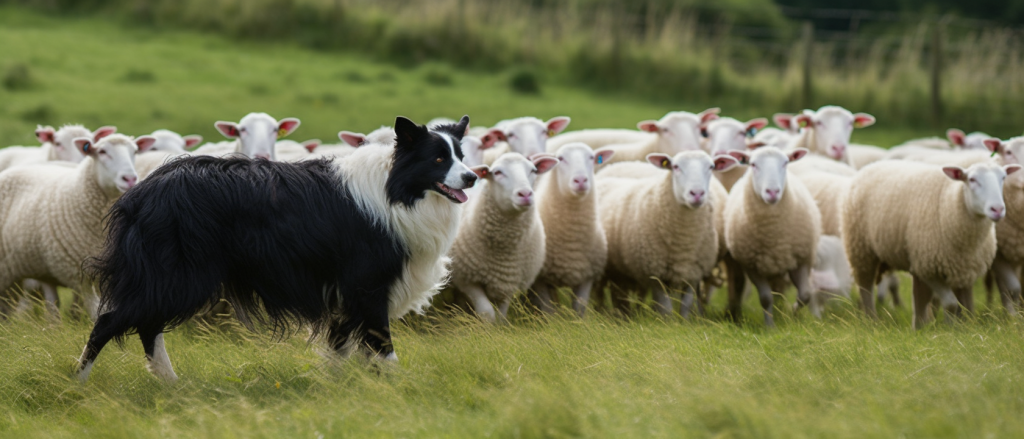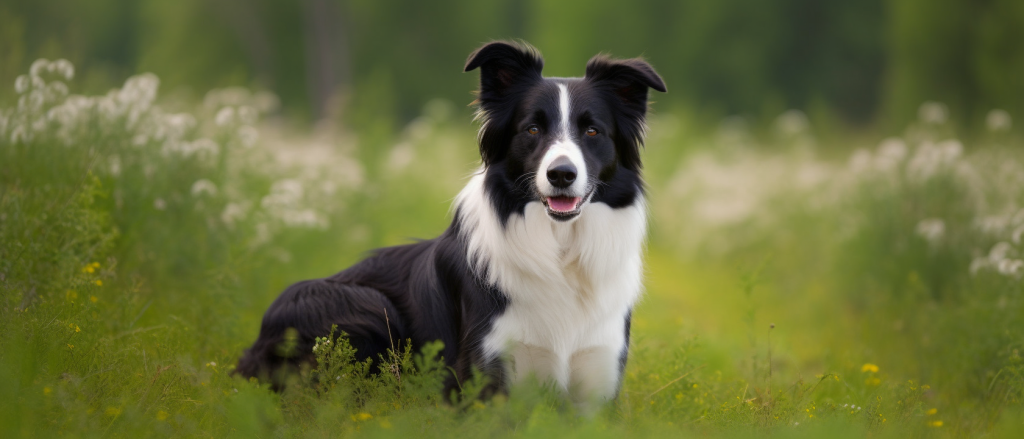Just as fast as they are smart, the border collie is an all-around canine superstar!
Takeaways
- Border collies are highly intelligent and full of energy
- Although they are wonderful dogs, border collies are not for everyone
- This high-energy herding breed needs loads of exercise and mental stimulation
- Border collies are a 12 to 15-year commitment to an active lifestyle
What to Know Before Getting a Border Collie
- Border collies are incredibly smart and athletic, they will require more time and energy than the average dog
- Exercising your border collie is a must! Most will require at least 90 minutes of exercise a day plus mental stimulation like puzzle toys and games
- Border collies shed frequently and will require regular brushing to keep their coat healthy
- Although it can be done with the right owner committed to daily outings, border collies are not ideal for apartment living
- Border collies are an amazing, loving, and loyal breed but they are a big responsibility and not the best breed for novice dog owners
An Introduction to Border Collies
Often topping the list of smartest dog breeds, the border collie is one clever canine. Known for their high intelligence and high energy, border collies excel in whatever task they are presented with. Whether chasing down sheep in pasture, dominating an agility course, or simply running after a frisbee, the border collie is a heck of an athlete!
While they may have roots in ancient Roman and Viking dogs, the modern border collie as we know it originated sometime in the 1800s in Northumberland. Agile herding dogs were crucial to life in the rocky highlands of this rural area on the border of England and Scotland. Over time, border collies spread to other countries and became known as “the world’s greatest herders.”
Today, border collies are still used as herding dogs all over the world. They also excel in agility sports and are an excellent companion for owners with an active lifestyle. Proper exercise and mental stimulation are key to keeping a border collie happy and healthy!
Key Traits of a Border Collie
While border collies are wonderful dogs, they are not for everyone. Owning a border collie comes with a serious commitment to exercise. This breed was made to work and a bored border collie is no fun for anyone! Thinking of getting a border collie? Here are some key traits of the breed to be aware of:
Energetic
Border collies need lots of exercise; remember–they were made to run around the countryside.! In addition to walks, most border collies need at least 90 minutes of other forms of exercise like running, hiking, or even swimming.
Intelligent
Border collies are highly intelligent and need lots of mental stimulation. They do great with training sessions, puzzle toys, enrichment mats, nosework, and agility.
Playful
Border collies love to play! Their owners should devote some time to tug-o-war, fetch, and other games to keep them entertained.
Affectionate
Most border collies are very affectionate with their owners. They love to snuggle up next to you or even hop in your lap. They are quite loving and loyal dogs and will always be happy to greet you at the door when you return home!

Breed Characteristics of a Border Collie
Like all dogs, border collies have certain characteristics that stem from their breed. Here are the most common characteristics you can expect from a purebred border collie.
Border Collie Size and Appearance
Border collies are medium-sized dogs that weigh between 30 and 55 pounds. Females typically weigh slightly less than males. Male border collies stand at a height of 19 to 22 inches while females are usually between 18 and 21 inches tall.
Border collies come in a variety of colors including bi-color and tri-color variations but are most commonly found in black and white. Their eyes are usually brown or blue, sometimes they’ll even have one of each!
Border collies are known for their expressive eyes and intense gaze, aptly known as the border collie stare or herding eye, a hallmark of the breed’s herding capabilities. Their ears can be pointed up or down, or, just like their eyes, sometimes they’ll have one of each!
Border Collie Temperament
Border collies are high-energy and extremely intelligent. They need a “job” to do such as running, hiking, agility, or of course, what they were bred to do–herding! Border collies are loyal, loving, and protective of their families but may be a bit aloof with strangers. Like any dog, early socialization is key. Border collies may enjoy socializing with other dogs as well as cats if properly introduced.
Border Collie Coat
Border collies have thick, double coats to protect them from the elements. Their coats come in either rough or smooth, sometimes referred to as short or long. Regardless of which type of coat your border collie has, they will shed quite a bit and need to be brushed regularly and kept free of mats and tangles.
Twice a year, your border collie will shed more than unusual as their coat goes through a molting process. This usually happens around the spring and fall. They will shed larger amounts of fur and require more frequent brushing.

Border Collie Health Conditions
Overall, border collies are considered a generally healthy breed but like all purebred dogs, they can be at risk for certain genetic conditions. Responsible border collie breeders will screen for these conditions as recommended by the Border Collie Society of America.
Health Conditions Associated with the Border Collie Breed:
- Hip dysplasia
- Deafness
- Eye disorders like renal atrophy and collie eye anomaly
- Neurological disorders like epilepsy and neuronal ceroid lipofuscinosis
- Trapped neutrophil syndrome (causes compromised immune system)
Border Collie Life Expectancy
The life expectancy of a healthy border collie is 12 to 15 years. Border collies are typically considered seniors when they reach 8 to 10 years of age. While they may not show signs of wanting to slow down, care should be taken to avoid putting too much stress on their joints. Swimming is a great low-impact exercise for a senior border collie (if they enjoy it!).
Border Collie Breeders vs. Border Collie Rescues
Once you’ve decided a border collie is the right dog for you, it’s time to do some research on where to find your new companion. To help ensure you are getting a healthy pup and not contributing to unscrupulous breeding operations, you’ll want to find a reputable border collie breeder or rescue group.
Finding a Border Collie Breeder
A good place to start in finding a reputable border collie breeder is the Border Collie Society of America’s breeder directory. These breeders are held to the highest standards. When interviewing breeders, there are a few key things to look for to ensure you are dealing with a responsible breeder.
How to Spot a Reputable Breeder
A responsible breeder will be open and transparent, allowing you to visit their home and meet the parent dogs. They will typically only have a few dogs and breed them sparingly. They will also have medical records, genetic testing, and veterinary references to back them up.
Responsible breeders will never sell you a dog without meeting you first. Responsible breeders will want to interview you just as much as you want to interview them. They will ask you questions about your home and lifestyle to ensure you are a good match for the puppy you are interested in.
Lastly, a responsible breeder will never be part of a commercialized breeding operation. They will not sell their puppies online, through social media, or puppy stores. Puppies sold through those methods are indicative of backyard breeding practices and puppy mills.
Questions to Ask a Breeder
- How long have you been breeding border collies?
- How many dogs do you have and how many times a year do you breed?
- Can I visit and meet the parents?
- What health tests have been performed and do you have records?
- Do you have veterinary references?
- Are you a member of an AKC-registered breed club?
Breeder Red Flags
- Haven’t been breeding long or displays limited knowledge of the breed
- Won’t allow a home visit or parent dogs are unavailable during the visit
- Too many dogs, unkempt living areas, dogs are left in cages all day, etc
- No health screening, records, or veterinary references
- Doesn’t care to meet you or ask you any questions, willing to sell you the puppy with no screening process, or sells puppies online
Finding a Border Collie Rescue
There are many wonderful border collies waiting for homes at rescues and shelters across the country. Sadly, they are one of the more commonly surrendered breeds due to inexperienced owners not being able to handle their energy levels. Another reason it is so important to do your research before adopting a border collie!
A good place to start your search is through the Border Collie Society of America’s rescue group network. You can also check in with your local shelters and rescues to see if they have any border collies available. If they don’t, some will allow you to leave your contact information should they get one in.
Keep in mind many border collie rescues will be a little bit older. This can be great in many ways because your border collie will most likely come already potty trained, spayed or neutered, and may have obedience training already under their belt as well! If you have your heart set on a border collie puppy, it may take a little longer but it’s not impossible. Keep an open dialogue with your local rescues and shelters.
What to Do Before Your Border Collie Arrives
Once you’ve found your perfect pup and made arrangements to adopt, you’ll want to begin preparing your home. This means buying all the essentials and of course, puppy-proofing!
New Puppy Checklist
- Bowls
- Leash
- Collar
- Crate
- Bedding
- Puppy pads
- Puppy-safe toys
- Grooming brush
- Nail clippers
Puppy-Proofing Your Home
- Make sure the floors are clear of shoes, toys, etc
- Secure or cover any loose electrical cords
- Make sure the trash is out of reach
- Check if any of your houseplants are poisonous, put them out of reach
- Make sure all medicine, chemicals, food, etc is secure (use pet-safe cabinet locks if necessary)
- Use dog gates to block off stairs
- Remove any “low-lying” items on coffee tables or bookshelves that may be within the puppy’s reach to chew like remote controls, flowers, magazines, etc.

Bringing Your Border Collie Puppy Home
The first few days of bringing your puppy home will be full of excitement, new experiences and lessons for both you and your pup!
Puppies are naturally curious, let them explore their new home but keep a watchful eye on them and set some boundaries to keep them safe. Start crate training and potty training right away to set them up for long-term success.
As your puppy grows, you’ll work on different aspects of training with them. Working with a trainer or incorporating some puppy kindergarten classes can be great additions to your training and regimen for a happy, well-rounded pup!
Feeding Your Border Collie Puppy
Talk to your breeder or rescue ahead of time and find out what they have been feeding, continue with that in the beginning. You don’t want to make an abrupt switch as it can lead to an upset tummy for the pup.!
At your puppy’s first check-up, consult your veterinarian about their diet. They’ll help you set a feeding plan based on your puppy’s age and health status. If you end up switching food, you’ll most likely need to do it slowly by mixing some of the old and new food to give your puppy time to adjust.
Veterinary Visits for a Border Collie Puppy
It’s always a good idea to get your new puppy in for a vet check-up as soon as possible. They will also most likely be due for some vaccines and/or deworming soon. Be sure to bring any records from your breeder or rescue to their first appointment.
Your veterinarian will check your puppy’s overall health, make sure your pup is parasite-free, and set up a vaccine schedule. This will be based on your puppy’s age and what vaccines they may have already had with the breeder or rescue.
Caring for Your Border Collie
Like any dog, border collies have special needs not only to survive but to thrive in your home. For a happy, healthy border collie, be sure you are meeting all their needs!
Exercise
Healthy adult border collies typically need a minimum of 90 minutes of exercise a day but some are much happier with 2 to 3 hours! Brisk walks, hikes, runs, games of fetch, and agility courses are all great ways to exercise your border collie. Mental stimulation is important too, snuffle mats, puzzle toys, and Kongs are all great enrichment tools for border collies. Bottom line, this high-energy dog breed needs to move!
Feeding
Like most highly active breeds, border collies can do very well on a high-quality, high-protein, sport diet. Since every border collie is unique, their age, weight, and activity level will factor into their feeding requirements. Have a discussion with your veterinarian about the best food for your border collie.
Healthcare
Healthy adult border collies should see their veterinarian at least once a year. Their annual check-up will likely consist of a physical exam, blood work, parasite screening, and updating any vaccines or parasite preventatives that are due. As they enter their senior years, check-ups are recommended every 6 months. In between routine visits, anytime your border collie shows any signs of illness or injury they should be seen by a veterinarian.
Grooming
A border collie’s coat requires regular brushing, about every other day. During the shedding season, they may need more. Because of the border collie’s protective coat, bathing is not recommended as often as in other breeds. In fact, over-bathing your border collie can dry out their skin. Most border collie experts recommend bathing every 3 to 4 months and using dog-safe dry shampoo or grooming wipes in between.
Pet Insurance for Border Collies
Having pet insurance for your border collie is a great way to help cover their veterinary costs, especially in the event of any unexpected emergencies. Policies vary based on age, breed, medical history, and location but insurance premiums for a border collie tend to range from $25 to $50 a month.
When shopping around for pet insurance for your border collie, it’s important to consider coverage for things like hip dysplasia which this breed can be prone to. Since border collies are so athletic it may be a good idea to get them on a plan that covers hydrotherapy. If your border collie sustains an orthopedic injury in their active lifestyle, hydrotherapy can be an important part of their recovery.
Border Collie FAQs
Are border collies good with children and other pets?
Border collies can be good with children and other pets but like any dog, proper socialization and introductions are needed. When it comes to children in particular, border collies are typically very loving and loyal to their families but may try to “herd” small children. Like with any dog, interactions with children should be supervised.
Are border collies suitable for apartment living?
Apartments are not ideal for a border collie and you may have a hard time finding a reputable breeder or rescue willing to place one in an apartment home. The best home for a border collie would be one with a yard and plenty of space for them to run. With that being said, if an owner is committed to providing plenty of daily exercise and enrichment, a border collie could live in an apartment. Daily runs, trips to the park, and interactive puzzle toys while inside can help meet your border collie’s needs in an apartment setting.
Do border collies have a tendency to nip or herd people?
Nipping and herding are natural behaviors for a border collie when they are herding sheep. Some border collies may display these behaviors towards humans, especially if they have pent up energy or frustration. Training and exercise are key to channeling these behaviors. Consider enlisting a trainer if you are having trouble working with your border collie on these issues.
Are border collies good guard dogs?
While border collies are loyal and protective of their families, they are not known as the ideal guard dog breed. They may alert you of danger but aren’t likely to confront it in the same way a traditional protection breed such as a German shepherd might.
What is the cost of owning a border collie?
The cost of owning a border collie is similar to that of your average dog. Between dog food, supplies, and veterinary care, you can expect to spend between $12,000 and $15,000 during your border collie’s lifetime. Barring any major medical issues, most people will spend around $1000 per year on their border collie.
Can border collies be left alone for long periods of time?
How long you can leave your border collie alone will depend on how their needs are being met. A border collie left alone after they’ve had a nice long walk or run will do vastly different than one that hasn’t had any exercise.
A general rule of thumb for most dogs is no more than 4 to 6 hours without at least a potty break and make sure they are getting enough exercise beforehand. If you have a border collie and a job that requires long periods away from home, consider hiring a dog walker or using a doggie daycare service.
